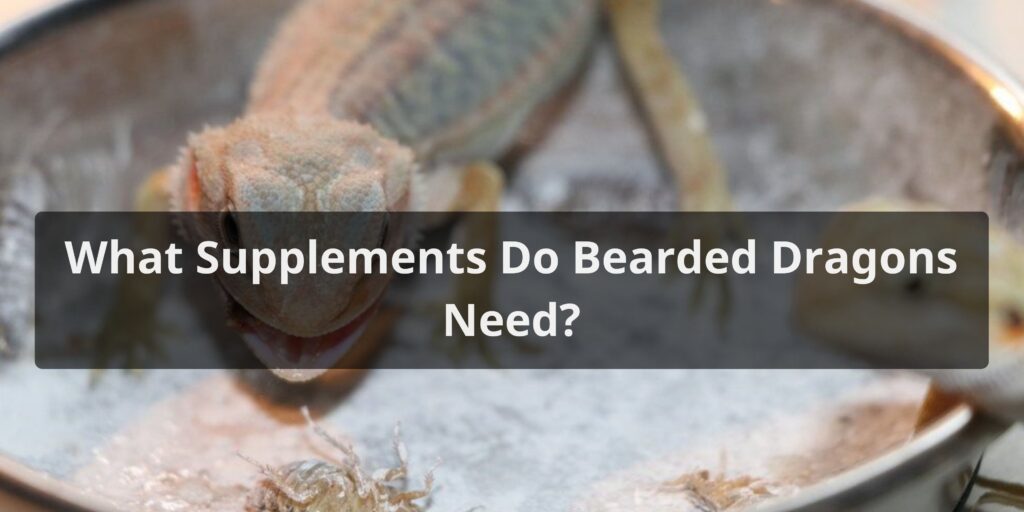Bearded dragons are a popular pet lizard known for their calm demeanor and unique, “beard” throat pouch. However, caring for these exotic pets requires paying special attention to their nutritional needs, including providing the proper vitamin and mineral supplements. When it comes to bearded dragon supplements, there are a few key what supplements do bearded dragons need that every owner should provide.
Calcium

Calcium is essential for bearded dragons to maintain healthy bones and for proper muscle and nerve function. Unlike mammals, reptiles cannot produce their own vitamin D3, which is needed to properly absorb and utilize calcium. Therefore, it’s critical that bearded dragons receive adequate calcium and vitamin D3 in their diet.
The main calcium supplement for bearded dragons should contain calcium carbonate and vitamin D3. It’s generally recommended to lightly “dust” feeder insects with calcium powder at every feeding for growing baby dragons and 2-3 times per week for adults. Stick to a light coating, as too much calcium can cause health issues.
Some good options for calcium supplements include:
- Zoo Med Repti Calcium with Vitamin D3
- Fluker’s Calcium with Vitamin D3
- Rep-Cal Calcium with Vitamin D3
Calcium powder designed specifically for reptiles is preferable over generic calcium supplements. The calcium to phosphorus ratio is balanced appropriately and contains vitamin D3 in safe amounts.
Multivitamins
While calcium is the most important supplement, providing a complete multivitamin 1-2 times a week is also advised. Multivitamins contain an array of vitamins and minerals bearded dragons need in small amounts. This includes vitamin A for eye and skin health, B vitamins for metabolism, and vitamin E for immune support.
Quality reptile multivitamins include:
- Repashy SuperVite
- Zoo Med ReptiVite
- Fluker’s Repta+Boost
Avoid using cat or dog vitamins, as they do not have the right nutritional balance for bearded dragons. Only use reptile-specific products to meet their needs.
Vitamin A
In addition to a multivitamin, some owners choose to provide an extra vitamin A supplement occasionally. Vitamin A supports healthy eyes, skin, and scales – all very important for shedding. Beta carotene is the preferred form of vitamin A for reptiles as it is safer.
As an optional supplement, vitamin A can be given every 2-4 weeks. But use caution – too much preformed vitamin A can cause toxicity. Some options include:
- Repashy SuperVite A
- Zoo Med Reptivite with Vitamin A
- Fluker’s Repta+Boost Vitamin A Supplement
Only use vitamin A supplements sparingly and not in combination with multivitamins containing vitamin A. Follow product labels for proper dosage.
Calcium With D3 vs Without D3

One important distinction when selecting calcium supplements for bearded dragons is whether it contains vitamin D3 or not.
- Calcium with D3 should be used for daily supplementation. This provides the essential vitamin dragons need to metabolize calcium.
- Calcium without D3 is used as an emergency supplement in case of accidental D3 overdose from other supplements. This allows you to continue providing calcium while stopping D3.
Having both types of calcium on hand is useful. Use calcium with D3 during normal supplementation and have plain calcium as backup in case issues arise.
Proper Supplement Schedule
Creating a proper supplement schedule ensures bearded dragons get the right vitamins and minerals in balance. Here are some general guidelines:
- Calcium 5-7 times per week – Lightly coat insects at every feeding for juveniles/subadults. Dust 2-3 times per week for adults. Use calcium with D3.
- Multivitamin 1-2 times per week – Provide a small amount 1-2 times per week. Use a reptile specific product.
- Vitamin A optional 2-4 times per month – Use reptile beta carotene vitamin A supplements sparingly every 2-4 weeks.
- Calcium without D3 as needed – Use as emergency calcium source if oversupplementing D3.
Following this schedule covers the essentials without overdoing any one nutrient. Adjust amounts and frequency based on your dragon’s age, health status, and appetite. Consult an exotic vet if you have questions about your pet’s specific needs. Proper nutrition and supplements supports a bearded dragon’s health and longevity.
Signs of Deficiency
Inadequate supplementation can lead to nutritional deficiencies in bearded dragons. Here are some signs of deficiency to watch out for:
- Lethargy, weakness
- Difficulty walking or limb tremors
- Swollen or deformed limbs or joints
- Slow growth
- Poor wound healing
- Loss of appetite
- Eyes appear swollen or sunken
- Dull, faded coloration and skin
If you notice any of these symptoms, schedule a vet visit right away to identify and correct the deficiency. Catching it early makes treatment much easier.
With the proper calcium, multivitamins, and care, bearded dragons can avoid deficiencies and remain healthy long-term. Providing supplements tailored to their needs as insectivores allows them to thrive.
Conclusion
Supplementing bearded dragons is an essential part of care to support bone health and prevent nutritional deficits. Calcium with vitamin D3 should be given at most feedings to aid proper calcium metabolism. A complete reptile multivitamin provides beneficial vitamins and minerals. An extra vitamin A supplement can also be used sparingly. Creating a schedule alternating these supplements covers all the bases for growing and adult dragons. With the right balance of supplementation, a bearded dragon can live a long, healthy life. Ensuring they get all the nutrients they need through diet and supplements is one of the most important responsibilities of any bearded dragon owner.
FAQs About What Supplements do Bearded Dragons Need
How often should I provide calcium supplements to my bearded dragon?
Offer calcium supplements with every meal to meet their calcium needs consistently. Young dragons and breeding females may require more frequent supplementation.
Can I use a multivitamin supplement for my bearded dragon?
Multivitamin supplements can be used, but they should not replace specific calcium and vitamin D3 supplements, which are essential. Multivitamins can complement their diet.
Do bearded dragons require additional supplements during breeding?
Yes, breeding females have increased calcium needs due to egg production. Provide extra calcium supplementation during this time, but consult with a veterinarian for specific guidance.
Can I provide natural sources of vitamins and minerals instead of supplements?
Yes, it’s ideal to include natural sources of vitamins and minerals in their diet, such as leafy greens and a variety of insects. However, supplements ensure they receive consistent and adequate nutrition.
What signs indicate that my bearded dragon may need supplements?
Signs of supplement deficiency may include weakness, lethargy, bone deformities, or metabolic bone disease. If you observe such signs, consult a veterinarian and assess their diet and supplementation.
Are there potential risks associated with over-supplementing bearded dragons?
Yes, over-supplementation can be harmful, especially with vitamin D3 and calcium. It can lead to toxicity and health issues. Follow recommended guidelines and consult with a reptile veterinarian if unsure about supplementation.





